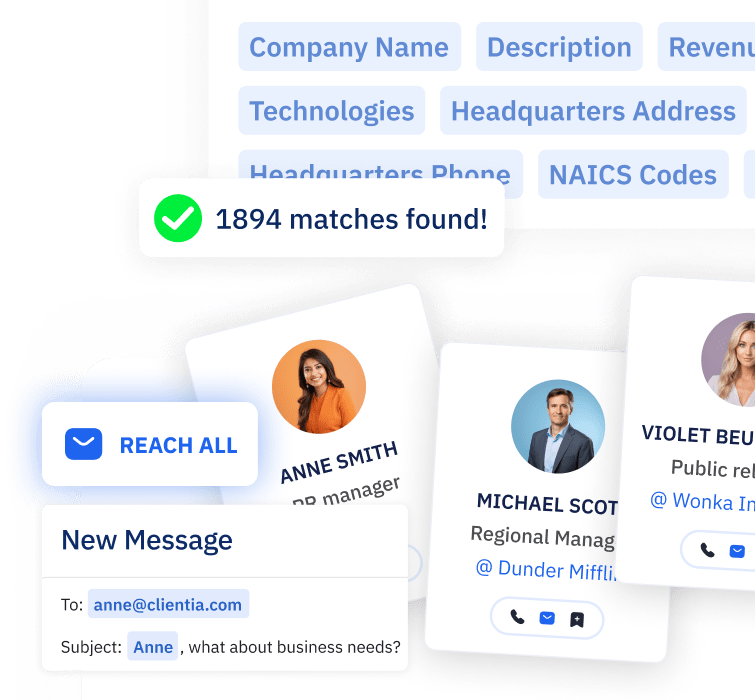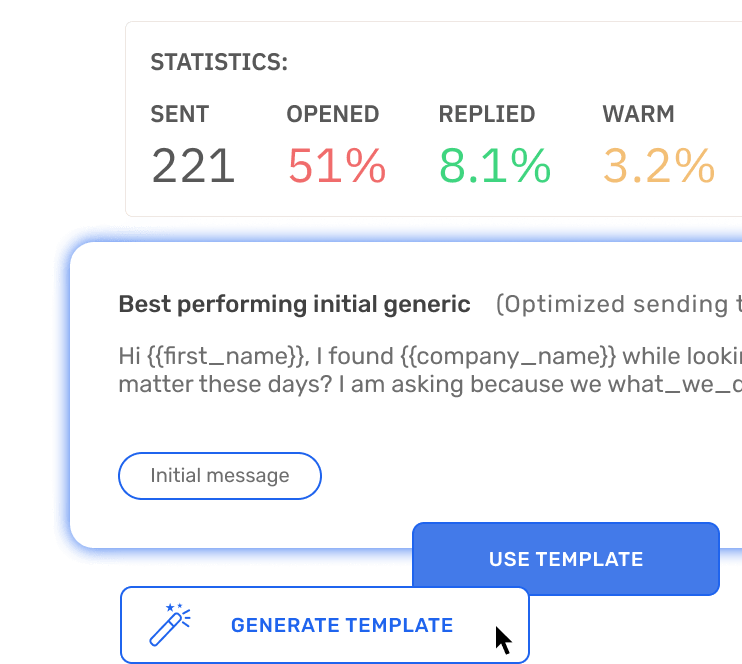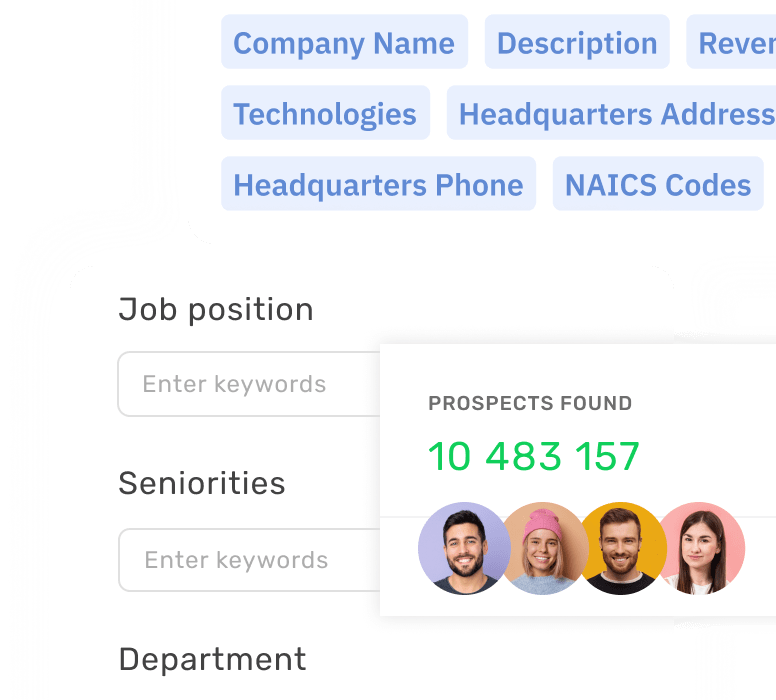The advent of artificial intelligence (AI) has catalyzed an unparalleled transformation across various industries, with sales being one of the primary beneficiaries. In an era where efficiency and customer engagement dictate market success, AI has emerged as a pivotal technology for sales teams looking to gain a competitive edge.
AI’s role in sales extends beyond automation, providing deeper insights and enabling personalized customer interactions that were once a far-fetched dream. Businesses that harness the potential of AI are not only streamlining their operations but are also witnessing substantial growth in customer satisfaction and loyalty.
66% say AI can help them provide a more personalized experience and understand their customers better. On top of that, 63% of sales leaders say AI makes it easier for them to compete with other businesses in their industry.
Source: hubspot.com
Key Takeaways
- Artificial intelligence (AI) is profoundly transforming sales by automating tasks and enabling personalized customer interactions, thereby enhancing efficiency and customer engagement.
- Integrating AI into sales processes leads to better decision-making due to data-driven insights, personalized experiences, increased efficiency, accurate sales forecasting, and effective lead qualification.
- AI transforms sales through predictive lead scoring, personalized content, sales process automation, real-time analytics, and dynamic pricing.
- Organizations face challenges integrating AI, such as data quality, resistance to change, and complexity of systems, which can be overcome with structured approaches including training and selecting user-friendly AI tools.
- AI plays a vital role in sales training and development by creating personalized learning paths and offering real-time feedback to drive continuous improvement within sales teams.
- The collaboration between sales and marketing is enhanced through AI, which improves lead quality and ensures unified data-driven customer strategies.
- Intelligent selling, driven by AI, focuses on strategic and personalized customer relations rather than just task execution.
- A successful AI adoption in sales involves assessing current processes, educating the team, choosing the right tools, implementing incrementally, and maintaining focus on data quality.
- AI enhances customer insights by creating detailed profiles, predicting behaviors, and allowing for hyper-personalization in marketing.
- AI influences every stage of the sales process from lead generation to post-sale support, streamlining operations and enhancing customer experience.
- The future of sales enablement is likely to be dominated by AI, predicting customer needs and guiding sales strategies with precision.
- AI significantly improves account management and analytics, predicting account health and suggesting tailored interactions.
- Sales productivity and efficiency are bolstered by AI through task automation, efficient data management, and performance tracking.
- Ethical considerations in AI for sales are paramount, including data privacy, transparency, bias prevention, and accountability.
- AI is set to continually reshape sales, with a commitment to ethical practices and a customer-centric approach being essential for leveraging its full potential.
The Benefits of AI in Sales
Integrating AI into the sales process offers a multitude of benefits that can revolutionize the way businesses operate. One of the most significant advantages is enhanced decision-making capabilities.
Benefit | Description |
Data-Driven Decisions | AI analyzes vast amounts of sales data to provide actionable insights. |
Personalized Experiences | Tailored product recommendations and communications for each customer. |
Increased Efficiency | Automation of routine tasks frees up time for strategic work. |
Sales Forecasting | Advanced predictive models can forecast future sales trends with higher accuracy. |
Lead Qualification | AI quickly identifies the most promising leads, increasing conversion rates. |
Furthermore, AI elevates customer engagement by creating personalized experiences, drawing from rich customer data to tailor interactions and offerings that resonate with individual preferences and behaviors.
AI for Sales Prospecting offers further insight into leveraging AI for lead generation—a critical step in sales success.
Key Ways AI is Transforming Sales
AI is not just about automation; it’s a strategic tool that’s reshaping the entire sales landscape. From lead generation to post-sale follow-ups, AI is drastically altering the way sales operations function.
One transformative aspect of AI in sales is the automation of mundane tasks, such as data entry and appointment scheduling. This not only improves efficiency but also allows sales representatives to dedicate more time to valuable activities such as relationship building and strategic planning.
Seek, pick, and reach
Connect with your potential customers
- 180m+ contacts
- Advanced filtering
- Multichannel sequences
- CRM integrations
Another key change brought about by AI is predictive analytics. Sales teams can now forecast with greater precision, translating into more targeted, proactive selling strategies. By aligning sales efforts with predictive insights, businesses can stay steps ahead in the rapidly evolving marketplace.
AI-Driven Transformations | Impact on Sales |
Predictive Lead Scoring | Prioritizes leads with the highest potential to convert. |
AI-Powered Personalization | Delivers custom content and offers to customers. |
Sales Process Automation | Eliminates manual tasks, streamlining sales workflows. |
Real-Time Analytics | Provides instant insights for quick decision-making. |
Dynamic Pricing | Adjusts prices based on market demand and customer data. |
Overcoming Challenges in Integrating AI
While integrating AI into sales processes can provide tremendous advantages, there are challenges that organizations must navigate. Common obstacles include data quality issues, resistance to change, and a lack of understanding of AI capabilities.
Some barriers preventing organizations from implementing AI include lack of skilled individuals, unclear ROI metrics, and complexity of AI systems.
Source: connect.comptia.org
Overcoming these challenges is crucial, and it often starts with addressing misconceptions about AI’s complexity and invasiveness. To smooth out the integration process, businesses should focus on incremental implementation, continuous education, and involving sales teams in the transition.
Common Integration Challenges | Solutions |
Resistance to Change | Provide training and show the value of AI. |
Data Privacy and Security | Implement robust cybersecurity measures. |
Complexity of AI Systems | Opt for user-friendly AI tools with support. |
Integration with Existing Systems | Choose AI solutions that are compatible with current tech stacks. |
Cost of Implementation | Assess ROI and consider scalable AI options. |
The Role of AI in Sales Training and Development
The introduction of AI in sales extends to training and professional development, offering rich, data-driven insights that can tailor programs to individual reps.
66% say AI can help them provide a more personalized experience and understand their customers better. On top of that, 63% of sales leaders say AI makes it easier for them to compete with other businesses in their industry.
Source: hubspot.com
Personalized learning paths created by AI algorithms can significantly enhance the effectiveness of sales training, ensuring that reps have the skills and knowledge needed when they need it. This leads to continuous improvement and development within the team.
For an in-depth exploration of sales enablement platforms, consider reading The Essential Guide to Sales Engagement Platforms.
Moreover, AI in sales training helps identify specific knowledge gaps and provides targeted learning resources, fostering a culture of self-improvement and agile adaptation to market changes.
Sales Training with AI | Impact |
Personalized Learning Paths | Custom training improves individual performance. |
Real-Time Feedback | Immediate analysis leads to faster improvement. |
Gamification | Engages salespeople in their own development. |
AI’s Impact on Collaboration Between Sales and Marketing
In many organizations, AI is bridging the historical gap between sales and marketing teams. By sharing AI-derived insights and analytics, these two pillars of revenue generation can now synchronize their strategies and goals more effectively than ever.
AI-driven collaboration tools facilitate seamless communication and data sharing, leading to a unified approach in targeting prospects and engaging customers. Marketing can leverage AI to qualify leads better, which sales can then convert with greater precision.
AI’s Collaboration Benefits | Impact on Sales and Marketing |
Lead Quality Improvement | Targeted marketing increases lead quality for sales. |
Unified Customer Data | Shared insights help tailor customer communication. |
Automated Content Delivery | Ensures consistent messaging across touchpoints. |
Beyond Automation: Intelligent Selling
Intelligent selling is the ethos driving AI in the sales domain beyond mere automation. It encompasses not just task execution but also the strategic and personalized manner of engaging with prospects.
Reach More with Less Effort
Connect with Potential Clients at scale
- AI message generator
- E-mail verification
- Multichannel sequences
- A/B testing
AI’s ability to analyze large datasets helps sales reps understand their customers deeply, enabling them to engage in insight-driven conversations. This bolsters the shift from transactional sales to relationship-focused strategies that are both meaningful and effective in achieving long-term customer loyalty.
Intelligent Selling Features | Description |
Predictive Behavior Modeling | Anticipates customer needs and interests. |
Dynamic Sales Scripting | Adapts sales pitches in real-time to improve relevancy. |
Market Sentiment Analysis | Gauges wider market trends for strategic planning. |
Strategies for Successful AI Adoption in Sales
For companies looking to integrate AI into their sales process, having a clear strategy is paramount. Here is a step-by-step guide for organizations embarking on their AI journey:
- Assess Current Sales Processes: Identify areas ripe for AI integration.
- Educate Your Team: Help them understand the benefits and functionality of AI.
- Select the Right Tools: Choose AI solutions tailored to your sales needs.
- Implement Incrementally: Take gradual steps to integrate AI into workflows.
- Monitor and Optimize: Continuously track performance and fine-tune the system.
Adhering to these strategies will facilitate a smoother transition and higher acceptance among the sales team, leading to successful adoption.
Strategy for AI Adoption | Description |
Start with Clear Objectives | Define specific goals for what AI needs to achieve in your sales process. |
Gain Organizational Buy-in | Educate and engage stakeholders about the benefits and potential of AI. |
Choose the Right Tools | Select AI tools that align with your sales objectives and integrate seamlessly with existing systems. |
Pilot and Scale Gradually | Begin with pilot programs and scale up AI initiatives based on successes and lessons learned. |
Focus on Data Quality | Ensure the data feeding into AI systems is accurate and clean to enable reliable insights. |
Provide Training and Support | Offer comprehensive training and support to help sales teams transition to AI-augmented processes. |
AI’s Role in Enhancing Customer Insights
AI’s capability to sift through data and extract meaningful insights is unmatched—transforming raw data into a goldmine of customer knowledge. With an enhanced understanding of customer behaviors and preferences, sales teams can engage in precisely timed and contextually relevant conversations.
The application of AI in customer insights also helps in creating highly personalized marketing campaigns, which can lead to an uplift in customer response rates and conversions. By tailoring offerings based on in-depth AI analytics, businesses are positioned to meet the exact needs of their customers, fostering stronger relationships and loyalty.
Customer Insights Enhancement | How AI Contributes |
Detailed Customer Profiles | AI analyzes data points to create rich, nuanced customer profiles. |
Predictive Customer Behavior | Machine learning models predict future behaviors based on past data. |
Sentiment Analysis | AI tools gauge customer mood and sentiment from communication. |
Hyper-Personalization | AI algorithms tailor experiences to individual customer preferences. |
AI at Every Stage of the Sales Process
AI is revolutionizing each stage of the sales process, from the initial point of contact to closing the deal and beyond. Here are some areas where AI plays a crucial role:
- Lead Generation: AI-powered tools can identify potential customers based on behavior and preference patterns.
- Lead Scoring: AI algorithms score leads, helping to prioritize those with the highest likelihood of conversion.
- Customer Engagement: Chatbots and virtual assistants provide 24/7 customer interaction, ensuring no lead goes unnoticed.
- Closing Sales: AI enables dynamic pricing and offers management, optimizing deals to benefit both the customer and the company.
- Post-Sale Support: AI systems can handle follow-ups and gather feedback, maintaining engagement long after the sale is complete.
Incorporating AI across these stages not only streamlines the sales process but also provides a comprehensive and seamless experience for the customer.
no prior experience & time required
Find your winning outbound formula with Concierge
- 95% activities on our behalf
- Avoid in-house SDR hire
- Learn & Take over anytime
- Numerous A/B tests
The Future of Sales Enablement in an AI-Powered World
The future looks decidedly AI-centric, with sales enablement platforms increasingly incorporating AI capabilities to empower reps. Going forward, AI is expected to become more intuitive, predicting not only customer needs but also the most effective engagement strategies for each individual prospect.
As we peer into the future of sales enablement, it’s anticipated that AI will take on a more active role, guiding sales teams with even more precision and allowing for real-time adjustments to sales tactics in response to ever-shifting market dynamics.
Future Predictions | Description |
Integration of AI with IoT and Big Data | Enabling more precise customer insights and actions. |
AI-Enhanced Virtual Reality for Product Demos | Immersive experiences for remote customers. |
Continued Growth of AI Communication Tools | Better engagement with clients through AI technology. |
AI in Account Management and Analytics
AI’s capabilities extend robustly into account management and analytics, providing a game-changing approach to monitoring customer accounts. With AI’s predictive analytics, sales teams can identify potential issues or opportunities within an account before they become apparent.
Sales professionals can now rely on AI to manage and analyze customer data, making informed decisions about which accounts need attention and strategically allocating resources. This results in not only better customer retention but also in identifying expansion opportunities within existing accounts.
AI Enhancements in Account Management | Description |
Real-time Account Updates | AI systems provide up-to-the-minute information on account status. |
Predictive Analytics for Account Health | Analyzes trends to alert sales to potential account risks. |
Tailored Interaction Suggestions | Recommends actions to improve account relationships. |
AI in Sales Productivity and Efficiency
Profitability in sales is often a direct function of productivity and efficiency, which AI has the power to enhance significantly.
Sales productivity tools powered by AI offer functionalities like automated task prioritization, opportunity alerts, and advanced scheduling to ensure that sales reps can focus their efforts where they are most needed. This leads to an optimization of time and resources, driving an increase in sales success rates.
Sales professionals save two hours and 15 minutes a day using AI to automate manual tasks
Source: hubspot.com
Here’s how AI influences efficiency:
Impact Area | Effect of AI |
Routine Task Automation | AI handles administrative tasks, allowing reps to focus on meaningful interactions. |
Customer Data Management | AI systems organize and analyze customer data for quick access and insights. |
Performance Tracking | Real-time tracking of metrics enables faster response to changes in sales dynamics. |
Sales Enablement | AI provides just-in-time training and information, keeping sales reps agile and knowledgeable. |
Ultimately, AI serves as a catalyst for productivity, propelling sales teams towards achieving and surpassing their targets with greater efficiency.
There are many sales outreach strategies and each of them can be enhanced by AI. Read the article to identify places where you can take advantage of it.
AI in Training and Professional Development
The development of sales professionals through tailored training and continuous learning is crucial for adapting to rapidly changing market conditions. AI helps in creating customized training modules and assessing performance in real-time, providing immediate feedback to guide professional growth.
78% of executives believe the benefits of generative AI outweigh its risks.
Source: shopify.com
Such individualized learning experiences not only facilitate better knowledge retention but also ensure that sales teams are proficient in the skills that matter most. By leveraging AI, organizations can implement a more strategic and data-driven approach to professional development, aligning employee growth with business objectives.
AI Benefits in Training and Development | Description |
Personalized Learning Experiences | AI analyzes performance data to tailor training programs. |
Automated Skill Assessments | AI provides ongoing assessments to identify areas for growth. |
Gamified Learning Environments | AI creates scenarios that engage and educate sales reps. |
AI in Communication and Relationship Building
AI is redefining the way sales professionals communicate with clients. With advanced language processing and machine learning, AI tools can help craft messages that resonate more effectively with the intended audience.
leave no lead unexplored
Every potential client within reach
- 180m+ contacts
- CRM integrations
- 23 Prospect filters
- 15 Company filters
Automated personalization at scale is one of the hallmarks of AI in sales communication. AI can guide reps in when and how to reach out, advising on the likely preferred communication channels and messaging styles of different customers, thus strengthening the relationship between client and company.
Thinking of sending outbound campaign? Read an article about effective cold email opening lines and write messages your prospects can’t resist.
AI Impact on Communication & Relationships | Description |
Enhanced Customer Interactions | AI chatbots provide timely communication to clients. |
Insightful Conversation Analysis | AI dissects patterns to improve customer relationships. |
Personalized Outreach | AI crafts messages that resonate with the recipient’s needs. |
AI in Sales Trend Analysis and Forecasting
Trend analysis and sales forecasting are critical components of strategic sales planning. AI’s capacity to process vast datasets allows for identifying emerging market trends and consumer preferences with unprecedented accuracy.
Companies equipped with AI-driven forecasting tools can anticipate shifts in demand, orient their inventory accordingly, and allocate resources to capitalize on upcoming opportunities. The predictive nature of AI in forecasting not only informs more reliable sales strategies but also offers a significant competitive advantage.
AI Advancements in Trend Analysis and Forecasting | Description |
Advanced Market Predictions | AI sorts through global trends to predict market movements. |
Sales Forecast Accuracy | Machine-learning models improve forecast reliability. |
Behavior Tracking | AI monitors consumer behavior to anticipate future sales trends. |
AI in Sales Reporting and Data Analysis
Sales reporting and data analysis are areas ripe for AI integration, as they are essential for measuring and enhancing sales performance. AI automates the generation of comprehensive reports, distilling complex data into actionable insights.
With AI, sales teams have access to real-time analytics and dashboards that detail performance metrics, client interactions, and market conditions, enabling sales professionals to make data-informed decisions swiftly.
AI in Reporting and Analysis | Impact |
Automated Reporting | AI simplifies the creation of sales reports. |
Data-Driven Insights | AI uncovers trends within sales data. |
Performance Benchmarking | AI benchmarks performance against goals. |
Ethical Considerations in AI for Sales
As AI takes on an increasing role in sales, it’s important to address ethical considerations, including data privacy and the potential for algorithmic bias. Ensuring that AI systems are transparent and accountable is paramount for maintaining customer trust.
Companies should adhere to ethical guidelines and best practices, ensuring that AI is used in a way that respects customer rights and promotes fair treatment. Establishing a framework for ethical AI use in sales not only protects companies legally but also reinforces their reputations as responsible and trustworthy entities.
Ethical Aspects of AI in Sales | Consideration Points |
Data Privacy | Safeguarding customer data and complying with regulations like GDPR. |
Transparency | Providing clarity on how AI systems make decisions. |
Bias and Fairness | Preventing AI algorithms from perpetuating or creating biases. |
Accountability | Establishing clear responsibility for AI-driven actions and decisions. |
Conclusion
AI’s integration into the sales arena marks a new era of intelligent selling, where efficiency, personalization, and strategic foresight become the cornerstones of success. The transformative impact of AI on sales is undeniable, and as technology evolves, its role will only grow more significant.
As we look to the future, it is clear that AI will continue to play a vital role in shaping the world of sales, creating exciting possibilities for businesses willing to embrace this digital frontier. The journey of integrating AI in sales is continuous, calling for a commitment to innovation, ethical practices, and an unwavering focus on the customer experience.




























